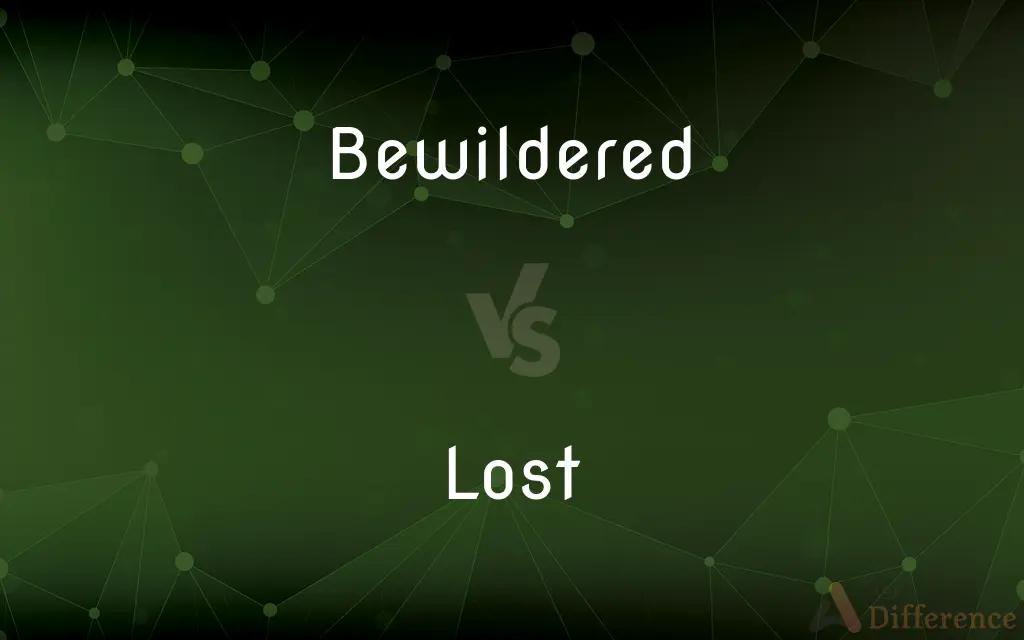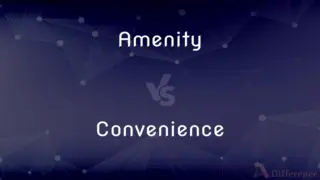Bewildered vs. Lost — What's the Difference?
By Tayyaba Rehman — Published on October 15, 2023
Bewildered" describes a state of confusion or being perplexed. "Lost" can mean physically misdirected or emotionally adrift. Both convey a lack of direction or understanding, but in varying contexts.

Difference Between Bewildered and Lost
Table of Contents
ADVERTISEMENT
Key Differences
"Bewildered" is an adjective capturing a state of confusion or being taken aback by something unexpected. When someone is bewildered, they're often momentarily caught off guard, unable to process the situation swiftly. On the contrary, "lost" is versatile, with its literal sense referring to not knowing one's whereabouts, and metaphorically, it can suggest being emotionally adrift or not understanding a topic.
While "bewildered" leans more towards a sudden shock or surprise, leading to confusion, "lost" can manifest over time. Someone might feel lost after significant life changes, indicating an emotional state of aimlessness. Yet, the same person might be bewildered by an abrupt piece of news, signaling immediate puzzlement.
A key nuance lies in the duration and depth of the feelings. Being bewildered is often temporary, a fleeting feeling until clarity is attained. However, feeling lost can be deeper, sometimes needing introspection or external help to rediscover direction. Both terms imply a lack of understanding, but "bewildered" is more about immediate reaction, while "lost" delves into prolonged uncertainty.
In summary, both "bewildered" and "lost" allude to states of uncertainty or lack of direction. However, while the former often indicates a transient, reactive confusion, the latter suggests a more prolonged, sometimes profound, sense of being adrift, whether physically or emotionally.
Comparison Chart
Primary Meaning
Confused or perplexed
Not knowing one's whereabouts or direction
ADVERTISEMENT
Duration
Often temporary
Can be prolonged
Depth
Surface-level confusion
Deeper sense of directionlessness
Context of Use
Reaction to sudden situations
Both physical and emotional states
Nature
Mental state
Physical or emotional state
Compare with Definitions
Bewildered
Characterized by confusion or puzzlement.
He looked bewildered by the sudden turn of events.
Lost
Having suffered the irretrievable loss of something.
She lost her cherished ring at the beach.
Bewildered
Feeling disoriented due to sudden information.
She was bewildered by the abrupt announcement.
Lost
Past tense and past participle of lose.
Bewildered
Lacking clarity or direction in a specific context.
His bewildered expression said it all.
Lost
Unable to find one's way
A lost child.
Bewildered
Taken aback; surprised in an unexpected situation.
The unexpected question left her bewildered.
Lost
No longer in the possession, care, or control of someone or something
A lost pen.
Bewildered
Unable to understand or make sense of.
The complex equation left the students bewildered.
Lost
No longer in existence; vanished or spent
Lost youth.
Bewildered
"Bewildered" is a popular song written in 1936 by Teddy Powell and Leonard Whitcup. It was a 1938 hit for Tommy Dorsey and His Orchestra.
Lost
No longer known or practiced
A lost art.
Bewildered
To confuse or befuddle, especially by being complicated or varied.
Lost
Beyond reach, communication, or influence
The expedition was lost to the world for two months.
Bewildered
To cause to lose one's bearings; disorient
"The whirling snow bewildered him" (May Kellogg Sullivan).
Lost
Not used to one's benefit or advantage
A lost opportunity.
Bewildered
Baffled, confused, mystified, at a loss, not thinking clearly, or uncertain.
He was just standing there, turning this way and that, with a bewildered look on his face.
Lost
Having not been or unlikely to be won; unsuccessful
A lost battle.
A lost cause.
Bewildered
Simple past tense and past participle of bewilder
Lost
Beyond recovery or redemption; fallen or destroyed
A lost soul.
Bewildered
Greatly perplexed; as, a bewildered mind.
Lost
Completely involved or absorbed; rapt
Lost in thought.
Bewildered
Perplexed by many conflicting situations or statements; filled with bewilderment;
Obviously bemused by his questions
Bewildered and confused
A cloudy and confounded philosopher
Just a mixed-up kid
She felt lost on the first day of school
Lost
Bewildered or confused
I'm lost—can you start over?.
Lost
Simple past tense and past participle of lose
Lost
Having wandered from, or unable to find, the way.
The children were soon lost in the forest.
Lost
In an unknown location; unable to be found.
Deep beneath the ocean, the Titanic was lost to the world.
Lost
Not perceptible to the senses; no longer visible.
An island lost in a fog; a person lost in a crowd
Lost
Parted with; no longer held or possessed.
A lost limb; lost honour
Lost
Not employed or enjoyed; thrown away; employed ineffectually; wasted; squandered.
A lost day; a lost opportunity or benefit; no time should be lost
Lost
Ruined or destroyed, either physically or morally; past help or hope.
A ship lost at sea; a woman lost to virtue; a lost soul
Lost
Hardened beyond sensibility or recovery; alienated; insensible.
Lost to shame; lost to all sense of honour
Lost
Occupied with, or under the influence of, something, so as not to notice external things.
To be lost in thought
Lost
Parted with unwillingly or unintentionally; not to be found; missing; as, a lost book or sheep.
Lost
Parted with; no longer held or possessed; as, a lost limb; lost honor.
Lost
Not employed or enjoyed; thrown away; employed ineffectually; wasted; squandered; as, a lost day; a lost opportunity or benefit.
Lost
Having wandered from, or unable to find, the way; bewildered; perplexed; as, a child lost in the woods; a stranger lost in London.
Lost
Ruined or destroyed, either physically or morally; past help or hope; as, a ship lost at sea; a woman lost to virtue; a lost soul.
Lost
Hardened beyond sensibility or recovery; alienated; insensible; as, lost to shame; lost to all sense of honor.
Lost
Not perceptible to the senses; no longer visible; as, an island lost in a fog; a person lost in a crowd.
Lost
Occupied with, or under the influence of, something, so as to be insensible of external things; as, to be lost in thought.
Lost
People who are destined to die soon;
The agony of the doomed was in his voice
Lost
No longer in your possession or control; unable to be found or recovered;
A lost child
Lost friends
His lost book
Lost opportunities
Lost
Having lost your bearings; confused as to time or place or personal identity;
I frequently find myself disoriented when I come up out of the subway
The anesthetic left her completely disoriented
Lost
Spiritually or physically doomed or destroyed;
Lost souls
A lost generation
A lost ship
The lost platoon
Lost
Not gained or won;
A lost battle
A lost prize
Lost
Incapable of being recovered or regained;
His lost honor
Lost
Not caught with the senses or the mind;
Words lost in the din
Lost
Deeply absorbed in thought;
As distant and bemused as a professor listening to the prattling of his freshman class
Lost in thought
A preoccupied frown
Lost
No longer known; irretrievable;
A forgotten art
A lost art
Lost civilizations
Lost
Perplexed by many conflicting situations or statements; filled with bewilderment;
Obviously bemused by his questions
Bewildered and confused
A cloudy and confounded philosopher
Just a mixed-up kid
She felt lost on the first day of school
Lost
Unable to function; without help
Lost
Unable to find one's way; not knowing one's whereabouts.
I got lost in the unfamiliar city.
Lost
Lacking direction or purpose in life.
After the breakup, he felt lost and alone.
Lost
Unable to understand or grasp a concept.
I was lost during the advanced lecture.
Lost
Defeated or experiencing failure.
The team lost the championship game.
Common Curiosities
Does "lost" only refer to physical location?
No, "lost" can also describe emotional states or lack of understanding.
Can someone be both bewildered and lost?
Yes, one can be confused (bewildered) about being directionless (lost).
How is "bewildered" different from "confused"?
Both indicate lack of clarity, but "bewildered" often implies being taken aback by something unexpected.
Can "bewildered" describe someone's reaction to a surprise?
Yes, someone can be bewildered by sudden, unexpected news.
Can "lost" describe someone's feelings after a life change?
Yes, someone can feel "lost" or directionless after significant life changes.
Does "bewildered" always indicate a negative emotion?
Not always, it mainly denotes surprise or confusion, which can be neutral.
Is "bewildered" a temporary state?
Often, yes. It usually denotes a transient state of confusion.
Do "bewildered" and "lost" mean the same thing?
No, while both indicate confusion, "bewildered" is about being perplexed, and "lost" can be about location or emotional state.
Can "lost" be used in the context of a game or competition?
Yes, it can indicate defeat, as in "they lost the match."
Can "lost" describe a person's understanding of a topic?
Yes, one can feel "lost" if they don't grasp a concept or topic.
Share Your Discovery

Previous Comparison
Plant Cell vs. Animal Cell
Next Comparison
Political Parties vs. Interest GroupAuthor Spotlight
Written by
Tayyaba RehmanTayyaba Rehman is a distinguished writer, currently serving as a primary contributor to askdifference.com. As a researcher in semantics and etymology, Tayyaba's passion for the complexity of languages and their distinctions has found a perfect home on the platform. Tayyaba delves into the intricacies of language, distinguishing between commonly confused words and phrases, thereby providing clarity for readers worldwide.
















































